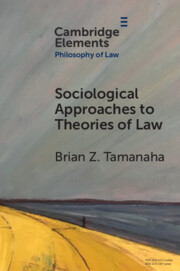Refine search
Actions for selected content:
5 results
Participation and Law’s Authority
-
- Journal:
- Canadian Journal of Law & Jurisprudence / Volume 36 / Issue 2 / August 2023
- Published online by Cambridge University Press:
- 29 May 2023, pp. 491-524
-
- Article
-
- You have access
- Open access
- HTML
- Export citation

Sociological Approaches to Theories of Law
-
- Published online:
- 18 May 2022
- Print publication:
- 23 June 2022
-
- Element
- Export citation
The Conceptual Problems Arising from Legal Pluralism
-
- Journal:
- Canadian Journal of Law & Society / La Revue Canadienne Droit et Société / Volume 37 / Issue 1 / April 2022
- Published online by Cambridge University Press:
- 14 January 2022, pp. 155-175
-
- Article
-
- You have access
- Open access
- HTML
- Export citation
16 - Bulygin’s Analytical Legal Positivism
- from Part III - Central Figures
-
-
- Book:
- The Cambridge Companion to Legal Positivism
- Published online:
- 21 January 2021
- Print publication:
- 04 February 2021, pp 371-394
-
- Chapter
- Export citation
14 - Avoiding Anarchy?
- from Part III - Functional, Analytical and Theoretical Views
-
-
- Book:
- Equity and Law
- Published online:
- 26 July 2019
- Print publication:
- 01 August 2019, pp 331-352
-
- Chapter
- Export citation
